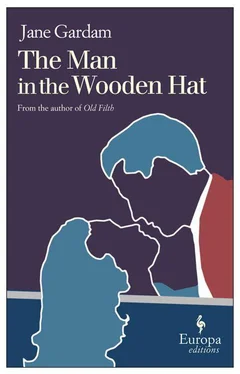“I must go home.”
Filth was looking troubled and Veneering thought: In a minute he’ll have to tell me that he’s locked himself out. Let’s see how he’ll get round that.
“It was good of you to come, Filth.”
Filth said nothing for a while. Then, “I really came to ask you if I could use your phone. Mine’s out of order. Expecting a taxi.”
(Well done, thought Veneering. Good opening move.)
“Mine will be out of order if yours is, I expect. But by all means try.”
The phone was dead.
(And the village is three miles away and the only spare key will be with his cleaner and it’s Christmas and she won’t be back until the New Year. And I’ve got him.)
“As a matter of fact,” Veneering said, “I’ve meant to come and see you several times.”
Filth looked into his whisky glass. He felt ashamed. He himself had never dreamed of doing any such thing.
“Only trouble was I couldn’t think of an excuse. Bloody hot-tempered type I was, once upon a time.”
“Bloody good judge, though,” said Filth, remembering that this was true.
“You were a bloody good Advocate. Come on. One more.
“The only excuse I could think of,” Veneering said in a minute, “was that there’s an old key of yours hanging up here in an outhouse. Has your address on it. Must have been here for years. Probably the last people here had been given one for emergencies. Maybe you have one of mine?”
“No, I don’t think so,” said Filth.
“Shall I get it? Or some other time?”
“I may as well take it now.”
On Veneering’s doorstep, the snow now thinning, wearing Veneering’s unpleasant overcoat, he heard himself say, “I have a ham shank at home. Tin of crabmeat. A good bottle. If you care to come over for Boxing Day?”
“Delighted,” said Veneering.
Down the slippery slope went Filth, holding very tightly to Veneering’s yews. He put the old Dexter key in the lock. Would it turn?
It did.
That spring Veneering began to play chess at Dexters once a week. Then twice a week, on Thursdays and Sundays. Each time, before he arrived, Filth moved Betty’s pink umbrella from the umbrella stand in the hall to the cupboard under the stairs. Later he would bring it out again. He also moved, right out of sight, the rather magisterial photograph on the chimney piece of Betty holding up the OBE for her good works and replaced it with one of himself and Betty laughing together in Bhutan on their honeymoon. Veneering appeared to notice nothing in the Feathers’ house except the chessboard.
As the year warmed they began to meet occasionally to walk in the lanes, and Veneering grew less yellow and arthritic. He tended to stop for every passer-by for conversation and cross-examination. His charm revived and he began again to take pleasure in everybody he met, especially if they were female. Females were always “girls.” He used the old upper-class lingo, thought Filth. Must have learned it at embassy parties. Certainly not in Middlesbrough where he was born. Filth’s snobbery was now appalling.
The “girl” Veneering liked best was pretty Dulcie, and on meeting they would stand bobbing about in the lane together while Filth inspected the sky or sometimes pretended his walking stick was a golf club and tried out a couple of swings. They sniff round each other like dogs, he thought. Come on, Veneering, you’ll catch cold.
“I begin,” said Filth to Betty’s shadow, “to wish I’d left the bloody key where it was. I’m stuck with him now.”
But he was not. On one chess Thursday, Veneering said, as he took Filth’s queen, “Oh, by the way, I’m going on a cruise.”
Filth took his time. He rather interestingly shifted a knight and took Veneering’s bishop. “Oh, well done!” said Veneering. “Yes, I’m off to the Mediterranean. Sailing to Malta. Getting some warmth into my joints.”
“I’m told it can be bitterly cold in Malta in March.”
“Oh, I’m hoping to stay with the Governor. I’ve met him once or twice. Nice wife.”
“You sound like Fiscal-Smith. You’re not going on a cruise with him, are you?”
“Good God, no. I’m striking out.”
Filth waited to see if he’d suggest that Filth himself might accompany him. He did not.
“Betty and I found that the few expats left on Malta were pretty ropy. She called them ‘the riff-raff of Europe.’”
“Did she? Oh, well, we’re all riff-raff now. I wouldn’t suggest Malta was the best place for you, Edward. Sea can be unpleasant and you’re too old to fly. Insurance would be tricky.”
“I know the sea, and you are hardly younger than I am. What about your insurance?”
“Not bothering. I’ve pots of money if I catch the Maltese flu and have to go to hospital. I dare say the Governor would see me right anyway.”
Filth thought that using a phrase like “see me right” was what he had always detested about Veneering.
The evening before he left for his cruise Veneering called on Filth with a supermarket bag full of leftovers of food that he thought Filth might like to make use of, and details of his cruise line. Filth took the leftovers into the kitchen and put them in the rubbish bin. He returned and said, “Why?”
“Well, then someone could let me know if there was a crisis.”
“You mean you’d want to know if I should kick the bucket?”
“Well, yes, of course.”
“In order to return for my funeral?”
“Certainly not. I’d probably send the odd flower. I’d come later for your memorial service. It wouldn’t be for several months, so I would be able to finish my philanderings. But yes, I’d want to know.”
Then he realised what he’d said. “Not, of course, that I’ve ever been a philanderer. Never. I was always serious, which was why my life has always been so exhausting — whatever it looked like. I do know how to love a woman.”
But he was getting in deeper.
Filth sat mute. This time Veneering had gone too far. His restored health had also restored his outrageous conceit. He was still the same— bounder —as before.
“I’ll walk home with you.”
“Oh.” Veneering hadn’t planned to leave just yet. He could smell Filth’s supper cooking.
“Must get my walk in before dusk,” said Filth. “Come on,” and he took his stick from the umbrella stand where (damn) he had forgotten to remove Betty’s pink umbrella. And (double damn) as, holding open the door for Veneering, he saw Veneering look at it, Bloody Hell— touch it!
Filth gave his queer roar. He led the way out, not to the lane end, but down his garden, past the tulip beds, the still-leafless orchard, past Betty’s still-wonderful kitchen garden, her pond, her spinney, and somehow they were back at the house again but now facing the steep track that led up a bank from an alley behind a shed.
“That’s the old earth closet,” said Filth. “Come on, I’ll show you a quick way home,” and he began to spring up the slippery bank like a boy.
Veneering followed on all fours.
“Good God, where are we going?”
“To the road,” said Filth. “You’d better take my hand. When we were just a cottage there used to be an opening on the lane up here. You had to climb through — ah, come on.”
Veneering hesitated, but eventually they stood together on the upper road in the coming dark.
“I found Betty standing here once,” said Filth. “Long ago. She’d been very ill. Somehow she found this place. To convalesce. The station taxi brought her to this opening on the road and she stayed here all by herself. I forget for how long. It seemed very long to me. I couldn’t phone. She didn’t answer my letters. I was in the middle of the Reservoir Case. You’ll remember it.”
Читать дальше












